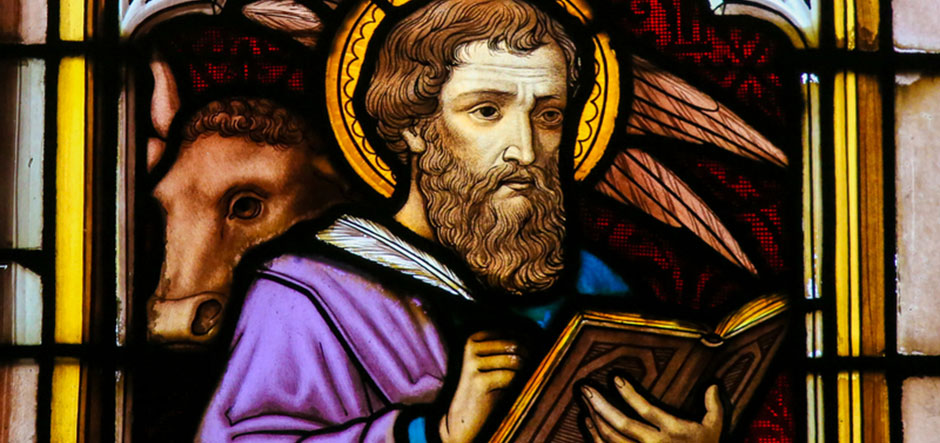St. Luke’s Legacy, Part I: Ministry and Mission
 Every time I come to the Collect for St. Luke the Evangelist, I feel like it in some ways it not only lays out something that’s important, but it also gently takes me by the front of my shirt and says, “Come on, you can do this, too.”
Every time I come to the Collect for St. Luke the Evangelist, I feel like it in some ways it not only lays out something that’s important, but it also gently takes me by the front of my shirt and says, “Come on, you can do this, too.”
A Continuing Ministry
What do I mean? After talking about Luke the Physician setting forth in the Gospel the love and healing power of the Son of God, we pray, “Graciously continue in your church this love and power to heal, to the praise and glory of your name.”
In other words, the assumption of the prayer is that the life and ministry that we see in Luke-Acts is, in fact, meant to continue in the church of God. In this way, there would be some genuine parallel in today’s church to the way God by his Holy Spirit acted then, through his Son and through his church. In other words, the Collect assumes these same markers would continue to manifest themselves in the life of God’s church in a way that points people to Jesus Christ.
But that was not a part of my seminary training. And quite frankly, especially when I was in seminary, any talk about the healing ministry of the church was either relegated to a group of people who prayed, but not much ever happened, or the “crazy charismatics” who looked a lot more like Pentecostals than they did Episcopalians. And, as my mother said to me very pointedly, “We are not one of them.”
And so I went on a real search to discover what this is and how it works. I’ve been to everything from Pentecostal camp meetings to all kinds of various healing services and ministries in and around the life of God’s church, pretty much spanning the entire spectrum of Christendom.
The other thing I’ve had to face, in both my training and in throughout the life of the church, is a kind of incipient agnosticism about what I see as St. Luke’s legacy. Some people state clearly that they want no part of it, and others (whether they admit it or not) pick and choose the scriptures they want to believe and teach, conveniently leaving the rest alone.
A Better Place
We still play, to our detriment, a kind of “We are not one of them.” Whenever you’re talking about “those people over there,” whether within or outside of the church, as a way to define what you’re reacting against, it automatically presents you as too far on the other side. In an effort to be balanced, we wind up being balanced about our own opinions, not necessarily the gospel we try to proclaim.
I get it. It’s easier at one level to live with a kind of spiritual reductionism. Because if I don’t live in the world as it is described in Luke-Acts, packed, as it were, with angels and demons and God intervening, interfering, some would say, in the affairs of humanity, I have a world that I feel like I can handle.
But if I’ve considered the fact that I, mere mortal borne by the Spirit of God, live in a world that I cannot see with the naked eye, that puts me in a whole different place. It’s a better place, because it drives me to my knees in a way that is, in fact, appropriate to the limitations of our sight: “For we know only in part, and we prophesy only in part” (1 Cor. 13:9b). But given the fact that most of what we learn deals with a world we can see, rather than a world we cannot see, it takes intentional work to ask God to come in and redo our vision, how we see the world.
A Mission Defined by God
But if I’m not willing to ask God to correct what I believe about the world, and my capacity on occasion to have the discernment to see into the unseen and act accordingly, I’m left with two conclusions. Either I’m trying to live as a Christian with one hand tied behind my back, or I don’t have complete information, which could guide me to make wrong decisions in the end.
And so I ask us to take seriously a quote from Dr. Robert Heaney, director of the Center for Anglican Communion Studies at the Virginia Theological Seminary, and at one point, a missionary in Tanzania. Heaney said, “Mission is, in fact, not defined by us. Mission is defined by God.”
What does living out God’s mission in a way that mirrors Luke-Acts look like? In Part II, we’ll delve deeper into this topic.
How does the unseen world affect our lives in the world we can see? Share this blog and your comments on Twitter. Please include my username, @revgregbrewer.
(This post is an adaption of Bishop Brewer’s sermon on October 18, 2016, at the Clergy Conference Eucharist, St. Augustine Chapel, Canterbury Retreat and Conference Center, Oviedo, Florida.)
Unless otherwise noted, scripture quotations are from the New Revised Standard Version Bible, copyright © 1989 the Division of Christian Education of the National Council of the Churches of Christ in the United States of America. Used by permission. All rights reserved.
PHOTO CREDIT: © Jorisvo | Dreamstime.com
